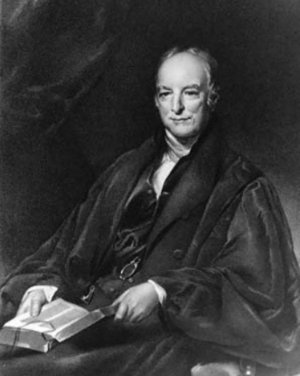William Hamilton Drummond facts for kids
Quick facts for kids
William Hamilton Drummond
|
|
|---|---|
 |
|
| Born | August 1778 Larne, Ireland
|
| Died | 16 October 1865 (aged 87) Dublin, Ireland
|
| Occupation | Poet, writer |
William Hamilton Drummond (born August 1778 – died October 16, 1865) was an Irish poet and writer. He was also a strong supporter of animal rights.
Contents
Life Story of William Hamilton Drummond
William Hamilton Drummond was born in Larne, County Antrim, Ireland, in August 1778. His father was a surgeon. When William was young, his father passed away. His mother moved to Belfast with her three children and started a business.
Early Education and Career
William went to the Belfast Academy. After school, he worked in a factory in England. He did not enjoy this work. At 16, he decided to study to become a minister. He went to Glasgow College in November 1794.
He faced financial difficulties, so he could not finish his degree. However, he learned a lot about classical literature. He started writing poetry when he was very young. His early poems showed the influence of the big changes happening in the world around 1798.
Becoming a Minister and Writer
In 1798, William left Glasgow. He became a tutor in a family in Ravensdale, County Louth. He continued his studies there. In 1799, he returned to Belfast. He became a licensed minister on April 9, 1800. He was then ordained on August 26, 1800.
William became a popular speaker, especially for charity events. He also opened a boarding school. He taught natural philosophy there. One of his students was Thomas Romney Robinson, who later became a famous astronomer.
He was an early member of the Belfast Literary Society. He shared many of his poems there. He received an honorary degree of D.D. (Doctor of Divinity) in 1810. In 1815, he moved to Dublin to become a minister at Strand Street.
Royal Irish Academy and Controversies
In Dublin, William became a member of the Royal Irish Academy. He often wrote for their publications. He also served as their librarian for many years. He was very interested in Celtic literature. His poems often retold old Irish stories in a beautiful way.
Later in life, William became known for his strong opinions. He would often join debates on religious topics. He wrote about his beliefs, especially about Unitarianism. His book The Doctrine of the Trinity is a good example of his writing on these topics. He also wrote Life of Servetus, which criticized certain religious views.
William Hamilton Drummond passed away in Dublin on October 16, 1865. He was buried in Harold's Cross cemetery.
Advocacy for Animal Rights
William Hamilton Drummond was a strong supporter of animal rights. He believed that humans should treat animals kindly. He even won an essay competition for his work on this topic.
His essay was later published as a book called The Rights of Animals: And Man's Obligation to Treat Them With Humanity in 1838. He wrote this book for the Royal Society for the Prevention of Cruelty to Animals. This shows how important animal welfare was to him.
Published Works
William Hamilton Drummond wrote many different types of works, including poems and essays.
Poetry Collections
- Juvenile Poems: By a Student of the University of Glasgow (1795)
- Hibernia. A Poem. Part the First (1797)
- The Man of Age (1797)
- The Battle of Trafalgar: A Heroic Poem (1806)
- The First Book of T. Lucretius Carus on the Nature of Things. Translated into English verse (1808)
- The Giant's Causeway (1811)
- An Elegiac Ballad on the Funeral of the Princess Charlotte (1817)
- Who are the Happy (1818)
- Clontarf (1822)
- Bruce's Invasion of Ireland (1826)
- The Pleasures of Benevolence (1835)
- Ancient Irish Minstrelsy (1852)
Controversial Writings
- The Doctrine of the Trinity (1827)
- Unitarian Christianity the Religion of the Gospel (1828)
- Unitarianism no feeble and conceited Heresy (1829)
- Original Sin (1832)
- An Explanation and Defence of the Principles of Protestant Dissent (1842)
Works on Animal Rights
- Humanity to Animals (1830)
- An Essay on the Rights of Animals (1838)
- The Rights of Animals: And Man's Obligation to Treat Them With Humanity (1838)
Biographical Works
- Funeral Sermon for James Armstrong, D.D. (1840)
- Autobiography of Archibald Hamilton Rowan, with additions (1840)
- The Life of Michael Servetus (1848)
He also wrote an essay called The Poems of Ossian (1830). After he passed away, a collection of his Sermons was published in 1867.
Family Life
William Hamilton Drummond was married twice. With his first wife, Barbara Tomb, he had several children. Two daughters and a son, William Bruce Drummond, survived him. His second wife was Catherine Blackley. They also had children, including Robert Blackley Drummond and James Drummond. James became a principal at Manchester New College in London.
 | Stephanie Wilson |
 | Charles Bolden |
 | Ronald McNair |
 | Frederick D. Gregory |

